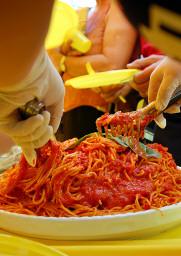Italy is to spearhead an international campaign to win UNESCO recognition for the Mediterranean diet, Italian Agriculture Minister Paolo De Castro announced on Tuesday.
Addressing a conference in Barcelona, the minister told delegates that Italy would team up with Spain, Greece and Morocco to ask the United Nation's educational and scientific organization to add the diet to its World Heritage List.
''The Mediterranean diet is a heritage that should be protected and shared,'' said De Castro.
''Science has long recognized the unusual health properties of the diet, which has strengthened and accompanied the common cultural identity of Mediterranean countries''. The UNESCO list is famous for its historic and cultural sites but in recent years the UN body has opened its register to include ''intangible heritage'', such as endangered languages or vanishing traditions. The Mediterranean diet is aiming for inclusion in this new category, which is so far home to music, dance and oral traditions from around the world. The four Mediterranean countries involved in the scheme will shortly set up work groups to identify the cultural, historic, manufacturing, social and gastronomic reasons for the diet's inclusion on the list. The final dossier for the joint candidacy will be unveiled in Rome at a special conference this summer.
The proposal will be handed over to UNESCO in August and the body then has until winter of 2009 to reach its decision. De Castro's announcement was greeted warmly in Italy. The head of the Italian Confederation of Farmers (CIA) Giuseppe Politi said it was an ''excellent idea''.
''The Mediterranean diet is a valuable asset that should be safeguarded and shared,'' he said.
''This campaign not only recognizes the characteristics of a healthy diet but will also help promote the history and culture of all Mediterranean countries''. Michele Carruba, a top nutritionist and director of Milan University's Obesity Studies Centre, said the initiative was ''fitting and extremely important''.
''It seems right that a recipe for longevity should be considered the heritage of all humanity,'' he said. ''It has been scientifically proven that those who follow the diet live longer and develop fewer diseases''. The benefits of the Mediterranean diet were first hailed over 60 years ago, when a US scientist stationed in Salerno started examining the correlation between health and food. But it was not until the 1990s that the diet achieved widespread recognition, despite several important corroborating studies in between. Today, the low-fat, high-fibre Mediterranean diet is considered one of the best recipes against health problems such as arthritis, obesity, diabetes, asthma and cardiovascular disease. Cereals, olive oil, certain fish, such as anchovy and tuna, and a high fruit and vegetable intake, including tomatoes, broccoli and blackberries, are thought to be among its important features.













